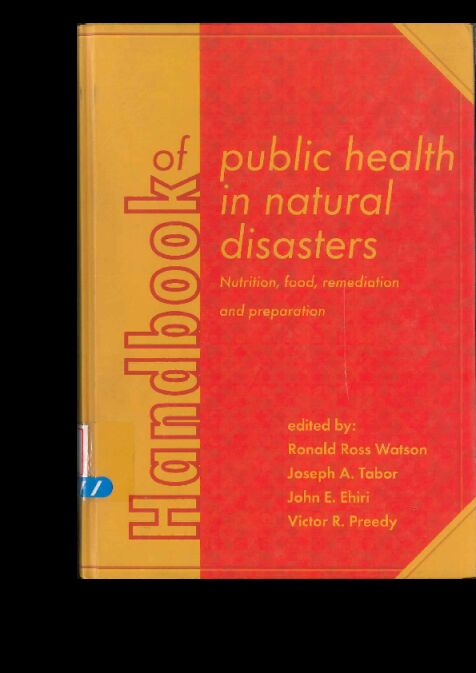书名:Handbook of public health in natural disasters
责任者:Ronald Ross Watson | Joseph A. Tabor | John E. Ehiri | Victor R. Preedy.
ISBN\ISSN:9789086862573,9086862578,9789086868063
出版时间:2015
出版社:Wageningen Academic Publishers,
摘要
The combination of growing populations moving into large cities in high risk zones increase the risk of natural disasters with a substantial public health consequence. A high population density and rapid air travel increase the spread and effects of plagues and diseases. People in countries with limited resources are more vulnerable to death and other consequences of disasters. This requires global rather than national preparedness and response strategies. Public health organisations, government and non-government organisations can take a leadership role and provide training, organisation and research knowledge to improve responses to such disasters.This book is the first holistic public health approach in relation to natural disasters. It fills the gap to have a one-stop-shopping synopsis of key ideas associated with mediation of public health natural disasters. It is unique in focusing on 'lessons learned' rather than 'what to do'. Published research relating to general responses by public health agencies to disasters is scientifically evaluated. Various types of disasters are reviewed: flooding, diseases, earthquakes, volcanoes, and drought. Long term needs, prevention and individual preparation are taken into account. The information can be used to prepare and mitigate effects of disasters.The summary points at the start of each chapter will help the reader to use as this book as reference book and for educational purpose.
查看更多
目录
Acknowledgements 11
Preparation and early public health responses to natural disasters
1.Connected preparedness: disaster preparation and media 15
2.The public health impacts of natural disasters 33
3.Climate and other forms of environmental change, disasters and public health 59
4.Public health in disaster preparedness: global natural disasters & public health's response 79
5.The physicians' response to climate change 97
6.Children's reactions and adjustment to natural disasters 113
7.Longer-term mental health needs of disaster survivors 125
8.Suicidal behaviours after natural disasters: trends and impacting factors 141
Floods, drought and hurricanes
9.Drought and crop failure result in improved crop and land management 155
10.Blood pressure changes in patients with or without chronic kidney disease after the Great East Japan Earthquake 171
11.Impacts of Hurricane Katrina on water quality in New Orleans 187
Earthquakes and volcanoes
12.Volcanoes: health effects and remediation strategies 205
13.Non-eruptive volcanogenic air pollution and health effects 223
14.The usage of complementary Food supplements for young children during natural disasters 235
15.Musculoskeletal injuries following earthquakes 251
16.Can a short-term intervention make a longer-term difference? Outcomes of cash and food for work programs in post-earthquake Haiti 265
17.Socio-economic impacts and consequences of earthquakes, Iran's perspectives 279
18.Earthquakes and impact on prevalence of metabolic syndrome 295
19.Earthquake, cardiovascular diseases and implications For public healfh 309
Disease, food and malnutrition in disasters
20.Drought, food security and micronutrient malnutrition 337
21.Disruptive innovation in primary care for the base of the pyramid 367
22.Community based management of severe acute malnutrition 379
23.Why does parenting matter after natural disasters? - a public healfh perspective on youth mental health 393
24.Assessment of malnutrition in rural settings 407
25.Omega-3 polyunsaturated Fatty acid potential for post-traumatic stress and depression 427
26.Nutritional qualities of fermented beans of coastal sand dune wild legume Canavalia maritima 441
27.Metal contamination in soils in the Mediterranean area and implications for the food chain 463
Epidemics and disease during disasters
28.Extreme weather events and vector-borne diseases 489
29.Malaria control and management in disastrous situations 513
30.Insect-borne diseases after earthquakes: China aspects 527
31.HIV/AIDS, food insecurity, and undernourishment: amplifying cycles of risk in vulnerable populations 537
32.Aflatoxin B1 and zearalenone in dairy feeds and its impacts in the food chain 563
33.Anthrax outbreaks and public health implications 583
Index 595
About the editors 607
查看PDF
查看更多
馆藏单位
中国医科院医学信息研究所



